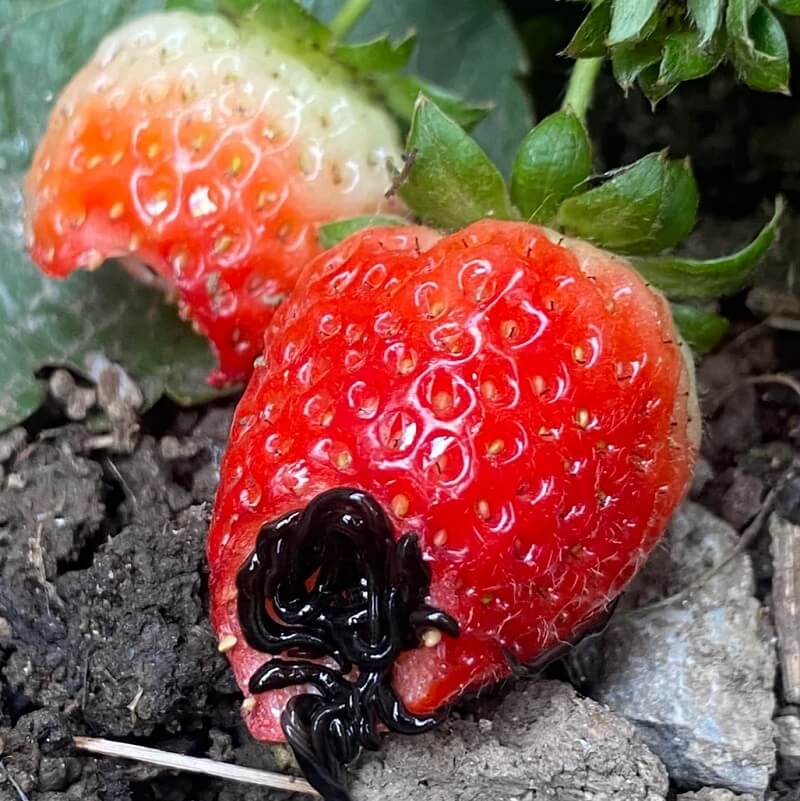If you're a gardener, you're probably used to seeing insects and other creepy crawlies in the garden. Whether it be a worm, beetle, or maybe even the occasional spider, seeing one of these bugs in the garden is just a part of working outside and barely warrants a second thought.
But should you spot a mass of the writhing devils one Redditor found nesting in their vegetable bed, try to resist the urge to set fire to your whole garden — because after seeing their disgusting little bodies and hearing about the havoc accidental ingestion can wreak on your body and mind, you're going to want to see them burn.

One gardener on Reddit had no idea what they were looking at when they began to discover the vile creatures infesting their strawberries during harvest.
"What is this?" the gardener asked other users in a post to the subreddit r/Gardening. "What helps deter these?"
"Those are New Guinea [flatworms], and they carry a parasite called rat lungworm," answered one user, as thousands of other users liked their comment in agreement.
It's true: New Guinea flatworms primarily feed on terrestrial invertebrates like slugs and snails, which are known to carry the rat lungworm parasite. Many of those who accidentally consume the parasite never see symptoms, but in some cases, the rat lungworm can find its way into the brain, causing a whole host of terrifying symptoms, including severe headache, neck pain, nausea, and vomiting.
Unfortunately, as many users in the comments articulated, there is no way to save your garden once overtaken by the flatworms.
"You can't save any of the fruit. It's dangerous to eat now," one person wrote. "Start over next year."
You can deter the worms from reaching your produce by heavily mulching around plants, which helps to prevent the flatworms from climbing onto plants from the soil. Plus, mulching deters slugs and snails; New Guinea flatworms are far less likely to enter your garden without their primary food source.
🗣️ What's the hardest thing about taking care of your yard?
🔘 Mowing the lawn 🏡
🔘 Controlling weeds 🌿
🔘 Keeping pests at bay 🐿️
🔘 I don't have a yard 🤷
🗳️ Click your choice to see results and speak your mind
While New Guinea flatworms are, without a doubt, some of the nastiest bugs you can find in your garden, and while they have been spotted as an invasive species in the southern United States, don't let the unlikely possibility of encountering them scare you away from the plethora of perks of growing one's own produce.
Besides having unlimited access, homegrown produce tastes better and has numerous benefits for the health of your body, mind, wallet, and the environment. You can expand these benefits even more with each type of produce grown at home.
It doesn't have to cost much to garden, either. A single $70 investment can produce up to 300 pounds of fresh fruit, vegetables, and herbs — approximately $600 worth — in just one year.
Not to mention that homegrown produce can significantly reduce your carbon footprint, too. Compared to store-bought produce, which creates 0.18 pounds of carbon per pound during transportation, growing 300 pounds of food in your garden at home can save about 50 pounds of carbon from entering the atmosphere.
Gardeners in the comments section of the original poster's post were horrified by the discovery of the repulsive critters but didn't seem to be deterred from their hobby. Many joked about how to best purge their garden of the New Guinea flatworms.
One user said: "I think I'm going to have nightmares."
"This is absolutely horrifying," one person wrote. "New fear unlocked."
"Looks like some eldritch horror is awakening. Have you tried sacrificing a virgin?" joked another user.
Join our free newsletter for easy tips to save more and waste less, and don't miss this cool list of easy ways to help yourself while helping the planet.









